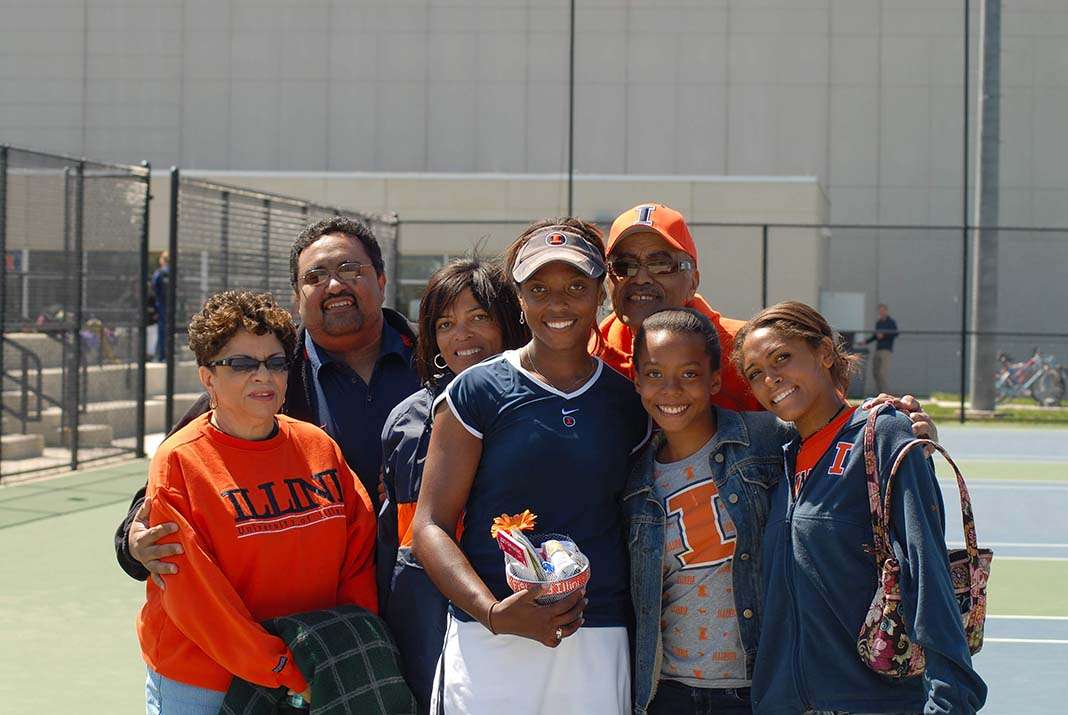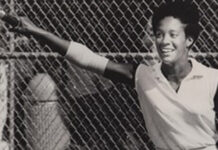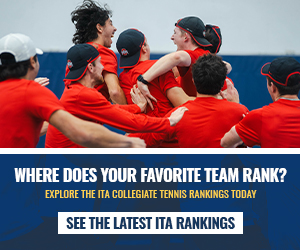In honor of National Girls and Women in Sport Day, the ITA is featuring some of the outstanding women who make up college tennis.
Kristina Minor competed for the University of Illinois for four years and was a three-time Academic All-American. After graduating from Illinois, Minor received her juris doctor from Marquette and MBA from Rutgers. Minor has made stops at Nike, the NCAA, the Big Ten Conference, and Rutgers before Northwestern.
Now at Northwestern, Minor serves as the Associate Athletic Director for Compliance and the sport administrator for the women’s tennis program.

ITA | Give us a quick rundown of your time playing sports. How did you come to play tennis for four years for the University of Illinois?
I come from a tennis-loving family, which I imagine started with my grandfather. My parents put me in a wide variety of sports and activities as a child. As schedules began to conflict at the higher levels, tennis just won out over the others. In high school, I went through the full recruiting process — did my research, created a list of all the places I might want to go, took my campus visits, talked through it all with my family and coach, and then made my decision that Illinois was the best holistic fit for me. The student-athlete experience is tough, but I loved it.
ITA | Representation matters. Who are some women that have inspired you to play tennis and sports in general?
Honestly, I didn’t realize the extent of how much representation matters until well after college. Growing up, I was surrounded by strong women and male allies in my family and community who encouraged me to do whatever I wanted. I suppose they were all the inspiration I needed.
ITA | During your time playing at Illinois, how did your confidence grow as a female athlete?
My confidence grew as I continued to push my own limits and rebound after failure. Whether it was completing that final sprint when I felt like throwing up, or studying for the LSAT on away trips. Eventually, I realized limits and insecurities were just ones I set for myself. Athletics quite literally showed me there was nothing my body or mind couldn’t do if I needed it to (subject to the right training and preparation of course).
ITA | Looking back on your collegiate career, when was a time that you felt the most powerful as an athlete?
The 1st round match of the NCAA tournament in my junior year. I pushed past exhaustion and dehydration and won in a 3rd set tiebreaker to clinch our team’s first top-20 upset and 2nd round appearance in five years.
ITA | How do you think playing a sport affects a girl’s confidence in her abilities and potential in life?
Through sport we learn how to compete fiercely, win and lose graciously, overcome obstacles, and develop our leadership style early in life. One of the best parts is the near immediate feedback from those lessons. For example, if you lose a heart-breaker on Saturday and have to play again on Sunday, you learn very quickly how to handle setbacks and failure.
ITA | You went to law school and have an MBA. What is it about college athletics that attracted you to the field?
As challenging and messy as college athletics is, the enterprise is worth protecting. I want to protect the access to higher education and intangible life lessons you learn as a student-athlete for as many people as I can. My niche within athletics is one outlet to use what I’ve learned in law school and business school and apply it to a field I’m passionate about.
ITA | Was there ever a time when you doubted a career in sport? How did you overcome those negative thoughts or obstacles?
Every once in a while, I take a step back and remind myself that God has given me a job to do based on my unique skills, interests, and abilities. Now that job may or may not be tied to my current career, and that is 100% okay. Either way, there’s a reason I am where I am right now. If I stay in sports, great. If I’m led elsewhere, I’ll continue to apply what I’ve learned through sport and transfer it to wherever I go.
ITA | You’ve worked at Nike, the NCAA, the Big 10, Rutgers, and now Northwestern. What lessons have you learned as a woman in the sports industry?
We need more women, and diversity in general. In my experience, one of the major problems is that without an intentional push, managers tend to hire/promote within their own circles, and those circles have historically been dominated by white males. As we continue to normalize women and BIPOC at the highest levels of sports, archaic gender and racial biases become less prominent.
ITA | When discussing issues around race in America, what is the most difficult question you’re asked and how would you encourage further conversations?
The most difficult questions are the ones that people don’t ask me. We can’t move forward if we’re scared to have the hard, honest conversations. Ask why I see a difference between “black lives matter” and “all lives matter.” Ask me why I see racism as a systemic problem rather than a case of a few “bad actors”. But when you ask, understand that one black person does not speak for all black people. I can give you my perspective, but you have to do the work on your own.
ITA | How can we use sports to change the landscape when dealing with racism?
The first step is to learn the history and acknowledge the fact that there are still racial inequities and injustices in sports. It’s slowly changing, but we (everyone) can’t settle for just some progress. If it’s not true and full equality, it’s not equality.
ITA | At Northwestern you are the sport administrator for the women’s tennis program. Is there anything that you do to mentor the student-athletes and help them grow on and off the court?
Our head coach is the on-court expert and has done her own fair share of glass-breaking. I try to limit my on-court involvement to being their biggest administrative cheerleader. Off the court, I try to lead and dispel stereotypes by way of example: Yes, women can be elite athletes and smart; be serious senior administrators and also fun, etc. I want to represent the limitless options we as women, especially black women, have.
ITA | What advice would you give to young girls considering playing a sport or working in sport?
If you’re thinking about it, just go try it! You may love it, or you may hate it. Either way, I promise you’ll learn something. I can tell you from personal experience, you’ll regret what you did or didn’t do out of fear of failing more than you’ll ever regret giving it 100% and failing. The possibility of flying is worth the risk.












